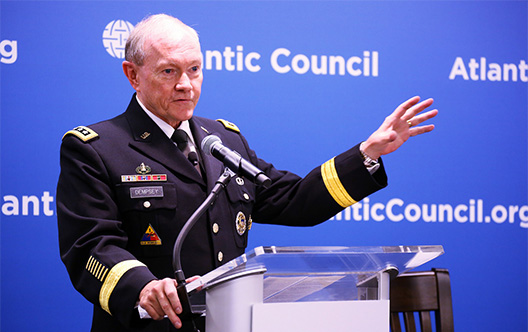 America’s top general plans to push his NATO counterparts to increase security contributions in southern Europe along the Mediterranean at a meeting of the alliance’s uniformed leaders this week.
America’s top general plans to push his NATO counterparts to increase security contributions in southern Europe along the Mediterranean at a meeting of the alliance’s uniformed leaders this week.
Instability and insurgent network activity across Northern Africa in Algeria, Egypt, Libya, Mali, Morocco and Tunisia — and the proliferation of that type of activity into and across Europe — has been increasingly worrying security officials in recent years.
“My personal advice to my fellow [chiefs of defense] in NATO is that the southern flank of NATO deserves far more attention than it currently receives from NATO,” Gen. Martin Dempsey, chairman of the Joint Chiefs of Staff, said May 14 at the Atlantic Council think tank. . . .
Security in southern Europe is primarily conducted by Mediterranean nations, including Portugal, Italy, France, Greece and Spain.
“Yet the issues that are emulating into the southern flank from the Middle East and North Africa could quite profoundly change life inside … not only southern Europe, but well into Central and Northern Europe,” Dempsey said. . . .
In addition to the North African security threat, there are also simmering territorial disputes surrounding recent energy finds in the eastern Mediterranean, said Barry Pavel, vice president and director of the Brent Scowcroft Center on International Security at the Atlantic Council.
“We know that where there’s significant new economic activity, security activity follows quickly, especially where there are uncertainties,” he said. “I think the new energy node in the eastern [Mediterranean] is going to also raise some new security issues. . . .
At this week’s NATO chiefs of defense meetings meetings, US leaders also plan to discuss the alliance’s force structure in eastern Europe, specifically in the wake of Russia’s military buildup along the Ukrainian border and invasion and annexation of Crimea.
“NATO is in a critical crossroads … given the aggressiveness of Russia,” Dempsey said. “It’s eastern flank needs to be reconsidered.”
Under a worst-case scenario, Russia’s actions in Ukraine could lead to the return of a Cold War-era footing in Europe with a build-up of military forces on the eastern part of the continent to reassure NATO allies there, Dempsey said.
“We are one incident away from being in a different security era regarding the Ukraine crisis,” Pavel said. “If this explodes and we get large-scale instability in Ukraine, then we are potentially in a situation where we have new insecurities on the border of NATO members.”
Image: Chairman of the Joints Chiefs of Staff General Martin Dempsey, May 14, 2014
